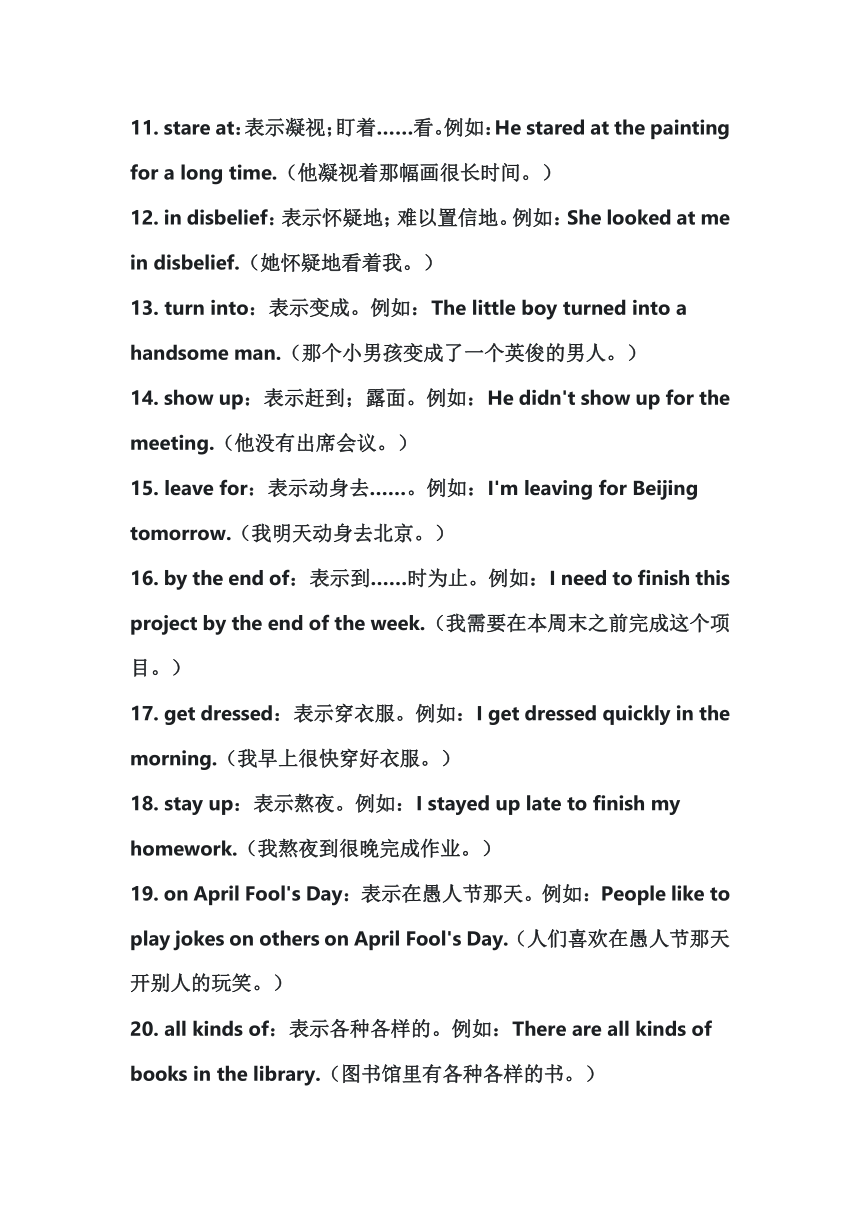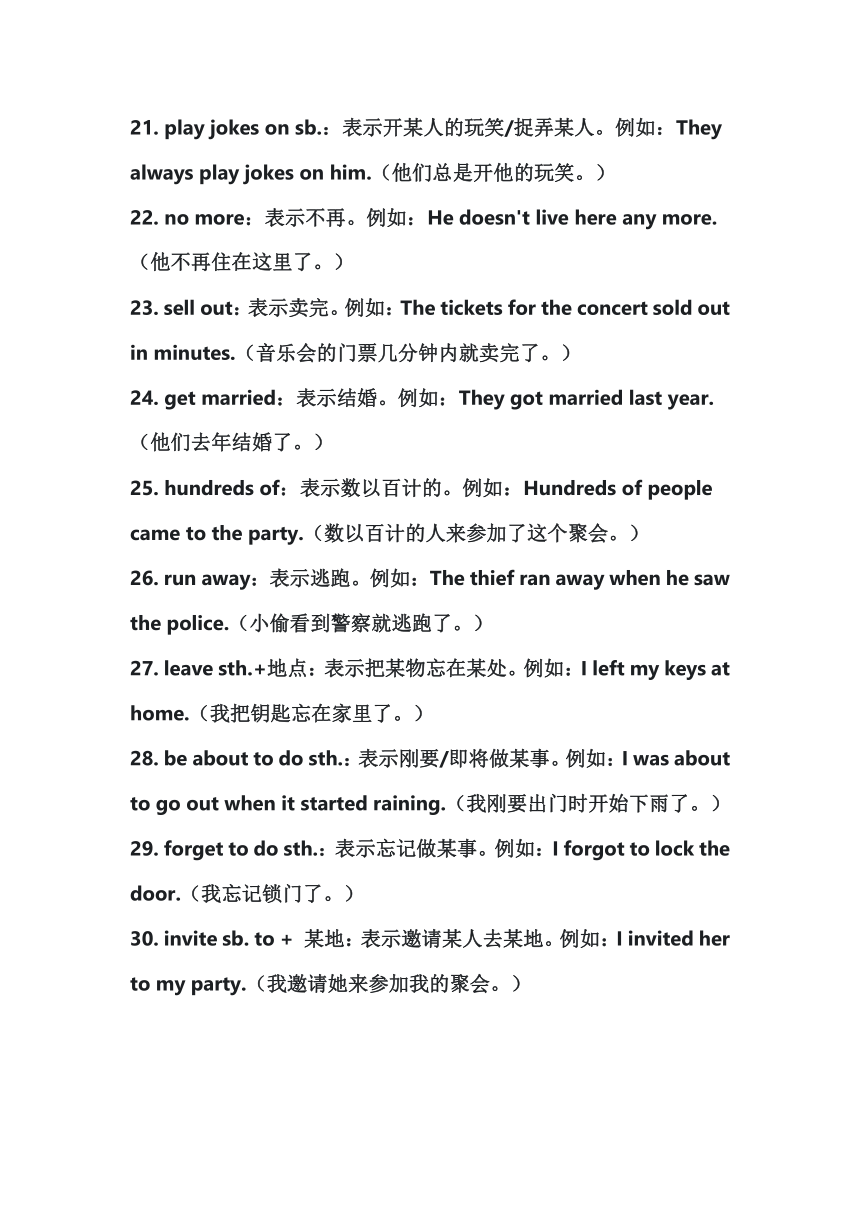Unit 12 Life is full of the unexpected固定短语具体用法讲义
文档属性
| 名称 | Unit 12 Life is full of the unexpected固定短语具体用法讲义 |

|
|
| 格式 | docx | ||
| 文件大小 | 20.1KB | ||
| 资源类型 | 教案 | ||
| 版本资源 | 人教新目标(Go for it)版 | ||
| 科目 | 英语 | ||
| 更新时间 | 2024-02-08 08:37:18 | ||
图片预览



文档简介
人教版英语九年级12单元固定短语具体用法讲义
一、短语具体用法和例句:
1. take a shower:表示淋浴。例如:I usually take a shower in the morning.(我通常在早上淋浴。)
2. by the time:表示到……的时候。例如:By the time I arrived, the meeting had already started.(当我到达时,会议已经开始了。)
3. be late for:表示迟到。例如:Don't be late for school tomorrow.(明天上学别迟到。)
4. go off:可以表示突然响起。例如:The alarm went off at 6 o'clock.(闹钟在 6 点钟突然响起。)
5. wake up:表示醒来。例如:I woke up feeling refreshed.(我醒来感觉神清气爽。)
6. rush out:表示冲出;奔出。例如:She rushed out of the house without saying goodbye.(她没说再见就冲出了房子。)
7. give sb. a lift:表示捎某人一程。例如:Can you give me a lift to the station (你能捎我一程去车站吗?)
8. be full of:表示充满;装满。例如:The room was full of people.(房间里挤满了人。)
9. be about to:表示刚要;即将。例如:I was about to leave when the phone rang.(我刚要离开时电话响了。)
10. wait in line:表示排队等候。例如:We had to wait in line for hours to buy tickets.(我们不得不排队等几个小时买门票。)
11. stare at:表示凝视;盯着……看。例如:He stared at the painting for a long time.(他凝视着那幅画很长时间。)
12. in disbelief:表示怀疑地;难以置信地。例如:She looked at me in disbelief.(她怀疑地看着我。)
13. turn into:表示变成。例如:The little boy turned into a handsome man.(那个小男孩变成了一个英俊的男人。)
14. show up:表示赶到;露面。例如:He didn't show up for the meeting.(他没有出席会议。)
15. leave for:表示动身去……。例如:I'm leaving for Beijing tomorrow.(我明天动身去北京。)
16. by the end of:表示到……时为止。例如:I need to finish this project by the end of the week.(我需要在本周末之前完成这个项目。)
17. get dressed:表示穿衣服。例如:I get dressed quickly in the morning.(我早上很快穿好衣服。)
18. stay up:表示熬夜。例如:I stayed up late to finish my homework.(我熬夜到很晚完成作业。)
19. on April Fool's Day:表示在愚人节那天。例如:People like to play jokes on others on April Fool's Day.(人们喜欢在愚人节那天开别人的玩笑。)
20. all kinds of:表示各种各样的。例如:There are all kinds of books in the library.(图书馆里有各种各样的书。)
21. play jokes on sb.:表示开某人的玩笑/捉弄某人。例如:They always play jokes on him.(他们总是开他的玩笑。)
22. no more:表示不再。例如:He doesn't live here any more.(他不再住在这里了。)
23. sell out:表示卖完。例如:The tickets for the concert sold out in minutes.(音乐会的门票几分钟内就卖完了。)
24. get married:表示结婚。例如:They got married last year.(他们去年结婚了。)
25. hundreds of:表示数以百计的。例如:Hundreds of people came to the party.(数以百计的人来参加了这个聚会。)
26. run away:表示逃跑。例如:The thief ran away when he saw the police.(小偷看到警察就逃跑了。)
27. leave sth.+地点:表示把某物忘在某处。例如:I left my keys at home.(我把钥匙忘在家里了。)
28. be about to do sth.:表示刚要/即将做某事。例如:I was about to go out when it started raining.(我刚要出门时开始下雨了。)
29. forget to do sth.:表示忘记做某事。例如:I forgot to lock the door.(我忘记锁门了。)
30. invite sb. to + 某地:表示邀请某人去某地。例如:I invited her to my party.(我邀请她来参加我的聚会。)
31. marry sb. = get married to sb.:表示和某人结婚。例如:She married a doctor. = She got married to a doctor.(她嫁给了一位医生。)
32. as+adj./adv.原级+as one can/could = as+adj./adv.原级+as possible:表示尽可能……地。例如:Run as fast as you can. = Run as fast as possible.(尽可能快跑。)
33. end up doing sth.:表示做完某事。例如:They ended up playing basketball.(他们最后去打篮球了。)
二、练习题:
1. I usually take a shower ___ the morning.
A. in B. on C. at
【解析】in the morning 是固定搭配,表示“在早上”,故选 A。
2. She ___ late for school yesterday.
A. is B. was C. be
【解析】由 yesterday 可知,句子时态为一般过去时,be late for 表示“迟到”,故选 B。
3. The alarm clock ___ before I woke up.
A. went off B. run away C. turned into
【解析】go off 表示“突然响起”,符合语境;run away 表示“逃跑”;turn into 表示“变成”,均不符合句意,故选 A。
4. I ___ when I heard the good news.
A. woke up B. stay up C. got up
【解析】wake up 表示“醒来”,stay up 表示“熬夜”,get up 表示“起床”,根据“when I heard the good news”可知,“我”听到好消息应该是“醒来”,故选 A。
5. He rushed out of the house ___.
A. quick B. quickly C. slow
【解析】quickly 是副词,修饰动词 rushed out,表示“快速地冲出去”,quick 是形容词,slow 也是形容词,均不符合句意,故选 B。
6. Could you please ___ me a lift to the station
A. give B. take C. bring
【解析】give sb. a lift 表示“捎某人一程”,是固定搭配,故选 A。
7. The room is ___ books.
A. full of B. fill with C. covered with
【解析】be full of 表示“充满;装满”,符合句意;fill with 表示“用……装满”,covered with 表示“被……覆盖”,均不符合句意,故选 A。
8. I ___ leave for Shanghai tomorrow.
A. am about to B. was about to C. will
【解析】根据“tomorrow”可知,句子时态为一般将来时,be about to do 表示“即将做某事”,will do 也表示“将要做某事”,故选 A 或 C。
9. You should ___ before going to bed.
A. get dressed B. take a shower C. brush your teeth
【解析】brush your teeth 表示“刷牙”,是睡前应该做的事情,get dressed 表示“穿衣服”,take a shower 表示“淋浴”,均不符合常识,故选 C。
10. We had to ___ in line for two hours to buy the tickets.
A. wait B. standing C. sat
【解析】wait in line 表示“排队等候”,had to 后接动词原形,B 和 C 都是非谓语动词形式,故选 A。
11. She looked at me ___ disbelief.
A. in B. with C. for
【解析】in disbelief 表示“怀疑地;难以置信地”,是固定搭配,故选 A。
12. The story ___ a real event.
A. turned into B. was turned into C. becomes
【解析】turn into 表示“变成”,故事变成了一个真实的事件,时态为一般过去时,故选 B。
13. He didn't ___ until 11 o'clock last night.
A. go to bed B. get up C. show up
【解析】go to bed 表示“上床睡觉”,get up 表示“起床”,show up 表示“露面”,根据“until 11 o'clock last night”可知,应该是昨晚 11 点还没“上床睡觉”,故选 A。
14. There are ___ of students in the playground.
A. hundreds B. two hundreds C. hundred
【解析】hundreds of 表示“数以百计的”,B 选项 two hundreds 表达错误,C 选项 hundred 需加 s 表示复数,故选 A。
15. He is always playing jokes on others. He is ___.
A. serious B. funny C. humorous
【解析】play jokes on sb. 表示“开某人的玩笑”,总是开别人玩笑的人应该是幽默的,serious 表示“严肃的”,funny 表示“滑稽的”,humorous 表示“幽默的”,故选 C。
一、短语具体用法和例句:
1. take a shower:表示淋浴。例如:I usually take a shower in the morning.(我通常在早上淋浴。)
2. by the time:表示到……的时候。例如:By the time I arrived, the meeting had already started.(当我到达时,会议已经开始了。)
3. be late for:表示迟到。例如:Don't be late for school tomorrow.(明天上学别迟到。)
4. go off:可以表示突然响起。例如:The alarm went off at 6 o'clock.(闹钟在 6 点钟突然响起。)
5. wake up:表示醒来。例如:I woke up feeling refreshed.(我醒来感觉神清气爽。)
6. rush out:表示冲出;奔出。例如:She rushed out of the house without saying goodbye.(她没说再见就冲出了房子。)
7. give sb. a lift:表示捎某人一程。例如:Can you give me a lift to the station (你能捎我一程去车站吗?)
8. be full of:表示充满;装满。例如:The room was full of people.(房间里挤满了人。)
9. be about to:表示刚要;即将。例如:I was about to leave when the phone rang.(我刚要离开时电话响了。)
10. wait in line:表示排队等候。例如:We had to wait in line for hours to buy tickets.(我们不得不排队等几个小时买门票。)
11. stare at:表示凝视;盯着……看。例如:He stared at the painting for a long time.(他凝视着那幅画很长时间。)
12. in disbelief:表示怀疑地;难以置信地。例如:She looked at me in disbelief.(她怀疑地看着我。)
13. turn into:表示变成。例如:The little boy turned into a handsome man.(那个小男孩变成了一个英俊的男人。)
14. show up:表示赶到;露面。例如:He didn't show up for the meeting.(他没有出席会议。)
15. leave for:表示动身去……。例如:I'm leaving for Beijing tomorrow.(我明天动身去北京。)
16. by the end of:表示到……时为止。例如:I need to finish this project by the end of the week.(我需要在本周末之前完成这个项目。)
17. get dressed:表示穿衣服。例如:I get dressed quickly in the morning.(我早上很快穿好衣服。)
18. stay up:表示熬夜。例如:I stayed up late to finish my homework.(我熬夜到很晚完成作业。)
19. on April Fool's Day:表示在愚人节那天。例如:People like to play jokes on others on April Fool's Day.(人们喜欢在愚人节那天开别人的玩笑。)
20. all kinds of:表示各种各样的。例如:There are all kinds of books in the library.(图书馆里有各种各样的书。)
21. play jokes on sb.:表示开某人的玩笑/捉弄某人。例如:They always play jokes on him.(他们总是开他的玩笑。)
22. no more:表示不再。例如:He doesn't live here any more.(他不再住在这里了。)
23. sell out:表示卖完。例如:The tickets for the concert sold out in minutes.(音乐会的门票几分钟内就卖完了。)
24. get married:表示结婚。例如:They got married last year.(他们去年结婚了。)
25. hundreds of:表示数以百计的。例如:Hundreds of people came to the party.(数以百计的人来参加了这个聚会。)
26. run away:表示逃跑。例如:The thief ran away when he saw the police.(小偷看到警察就逃跑了。)
27. leave sth.+地点:表示把某物忘在某处。例如:I left my keys at home.(我把钥匙忘在家里了。)
28. be about to do sth.:表示刚要/即将做某事。例如:I was about to go out when it started raining.(我刚要出门时开始下雨了。)
29. forget to do sth.:表示忘记做某事。例如:I forgot to lock the door.(我忘记锁门了。)
30. invite sb. to + 某地:表示邀请某人去某地。例如:I invited her to my party.(我邀请她来参加我的聚会。)
31. marry sb. = get married to sb.:表示和某人结婚。例如:She married a doctor. = She got married to a doctor.(她嫁给了一位医生。)
32. as+adj./adv.原级+as one can/could = as+adj./adv.原级+as possible:表示尽可能……地。例如:Run as fast as you can. = Run as fast as possible.(尽可能快跑。)
33. end up doing sth.:表示做完某事。例如:They ended up playing basketball.(他们最后去打篮球了。)
二、练习题:
1. I usually take a shower ___ the morning.
A. in B. on C. at
【解析】in the morning 是固定搭配,表示“在早上”,故选 A。
2. She ___ late for school yesterday.
A. is B. was C. be
【解析】由 yesterday 可知,句子时态为一般过去时,be late for 表示“迟到”,故选 B。
3. The alarm clock ___ before I woke up.
A. went off B. run away C. turned into
【解析】go off 表示“突然响起”,符合语境;run away 表示“逃跑”;turn into 表示“变成”,均不符合句意,故选 A。
4. I ___ when I heard the good news.
A. woke up B. stay up C. got up
【解析】wake up 表示“醒来”,stay up 表示“熬夜”,get up 表示“起床”,根据“when I heard the good news”可知,“我”听到好消息应该是“醒来”,故选 A。
5. He rushed out of the house ___.
A. quick B. quickly C. slow
【解析】quickly 是副词,修饰动词 rushed out,表示“快速地冲出去”,quick 是形容词,slow 也是形容词,均不符合句意,故选 B。
6. Could you please ___ me a lift to the station
A. give B. take C. bring
【解析】give sb. a lift 表示“捎某人一程”,是固定搭配,故选 A。
7. The room is ___ books.
A. full of B. fill with C. covered with
【解析】be full of 表示“充满;装满”,符合句意;fill with 表示“用……装满”,covered with 表示“被……覆盖”,均不符合句意,故选 A。
8. I ___ leave for Shanghai tomorrow.
A. am about to B. was about to C. will
【解析】根据“tomorrow”可知,句子时态为一般将来时,be about to do 表示“即将做某事”,will do 也表示“将要做某事”,故选 A 或 C。
9. You should ___ before going to bed.
A. get dressed B. take a shower C. brush your teeth
【解析】brush your teeth 表示“刷牙”,是睡前应该做的事情,get dressed 表示“穿衣服”,take a shower 表示“淋浴”,均不符合常识,故选 C。
10. We had to ___ in line for two hours to buy the tickets.
A. wait B. standing C. sat
【解析】wait in line 表示“排队等候”,had to 后接动词原形,B 和 C 都是非谓语动词形式,故选 A。
11. She looked at me ___ disbelief.
A. in B. with C. for
【解析】in disbelief 表示“怀疑地;难以置信地”,是固定搭配,故选 A。
12. The story ___ a real event.
A. turned into B. was turned into C. becomes
【解析】turn into 表示“变成”,故事变成了一个真实的事件,时态为一般过去时,故选 B。
13. He didn't ___ until 11 o'clock last night.
A. go to bed B. get up C. show up
【解析】go to bed 表示“上床睡觉”,get up 表示“起床”,show up 表示“露面”,根据“until 11 o'clock last night”可知,应该是昨晚 11 点还没“上床睡觉”,故选 A。
14. There are ___ of students in the playground.
A. hundreds B. two hundreds C. hundred
【解析】hundreds of 表示“数以百计的”,B 选项 two hundreds 表达错误,C 选项 hundred 需加 s 表示复数,故选 A。
15. He is always playing jokes on others. He is ___.
A. serious B. funny C. humorous
【解析】play jokes on sb. 表示“开某人的玩笑”,总是开别人玩笑的人应该是幽默的,serious 表示“严肃的”,funny 表示“滑稽的”,humorous 表示“幽默的”,故选 C。
同课章节目录
- Unit 1 How can we become good learners.
- Section A
- Section B
- Unit 2 I think that mooncakes are delicious!
- Section A
- Section B
- Unit 3 Could you please tell me where the restroom
- Section A
- Section B
- Unit 4 I used to be afraid of the dark.
- Section A
- Section B
- Unit 5 What are the shirts made of?
- Section A
- Section B
- Review of Units 1-5
- Unit 6 When was it invented?
- Section A
- Section B
- Unit 7 Teenagers should be allowed to choose their
- Section A
- Section B
- Unit 8 It must belong to Carla.
- Section A
- Section B
- Unit 9 I like music that I can dance to.
- Section A
- Section B
- Unit 10 You're supposed to shake hands.
- Section A
- Section B
- Review of Units 6-10
- Unit 11 Sad movies make me cry.
- Section A
- Section B
- Unit 12 Life is full of the unexpected
- Section A
- Section B
- Unit 13 We're trying to save the earth!
- Section A
- Section B
- Unit 14 I remember meeting all of you in Grade 7.
- Section A
- Section B
- Review of Units 11-14
